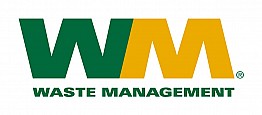Founded in 1971 and headquartered in Houston, Texas, Waste Management is  the largest US-based company in the environmental and waste industry sector. The company serves more than 21 million municipal, commercial and industrial customers in the US and Canada. In 1988—at a time when recycling rates in the US were a mere ten percent—it launched its first major curbside recycling program. It is not a coincidence that domestic recycling rates have tripled in the decades since then.
the largest US-based company in the environmental and waste industry sector. The company serves more than 21 million municipal, commercial and industrial customers in the US and Canada. In 1988—at a time when recycling rates in the US were a mere ten percent—it launched its first major curbside recycling program. It is not a coincidence that domestic recycling rates have tripled in the decades since then.
According to its 2017 Sustainability Report Update, Waste Management’s business operations include 243 landfills; methane gas is extracted from 131 of them, enough to power some 470,000 homes, and offset more than two million tons of coal per year. The company also boasts the largest fleet of fleet of natural gas trucks in North America, and 28 of its 104 natural gas filling stations are open to the public. Over 30% of the company’s natural gas trucks operate on Renewable Natural Gas, one of the lowest carbon vehicle fuels available.
North America’s largest residential recycler, Waste Management manages 14 million tons of recycled or reused material annually, with a goal of 20 million tons by 2020. Its 310 transfer stations include 96 traditional recycling facilities, 43 single-stream facilities, and eight construction and demolition recycling facilities. Forty-three organics processing facilities manage more than two million tons of organics each year, which are converted to compost, mulch, and, via anaerobic digestion, energy.
Working to help customers achieve high recycling rates, Waste Management was among the industry’s earliest adopters of the single-stream recycling method, in which recyclables—glass, metal, plastic and paper—are recycled together and then separated at a materials recovery facility (MRF). The company found that single stream recycling consistently increased both recycling participation and tons collected.
While the ease of single-stream recycling is credited with helping to drive higher recycling rates, it is also undeniable to many critics that increased contamination has led to a devaluation of the worth of recycled commodities. In response, Waste Management developed its “RecycleOften.RecycleRightSM” recycling education program, and has continued to invest in technologies at its MRFs. Additional optical sorters, new types of conveyors, and a recently installed robotic unit in a MRF located outside Houston, are all part of WM’s efforts to improve the quality of recyclables moving through its facilities. “We’re testing it now, but it definitely will make cleaner material and it will make our plant more efficient,” Brent Bell, vice president of recycling, recently told Resource Recycling. Bell also noted that the company is seeking to form more relationships with companies that espouse the use of recycled materials in their branding.
Waste Management’s sustainability goals go beyond sustainable materials management. Its efforts to address the risks of climate change have resulted in its being included on CDP’s 2017 Climate A List in 2017, for the second year in a row. Fewer than five percent of companies reporting on GHG emissions to CDP make the A list. “With help from our employees and customers, working toward reductions in greenhouse gas emissions is the right thing to do for our planet, for our company and for our future generations,” CEO Jim Fish said.
The publicly traded company was selected for inclusion in the Dow Jones Sustainability Index for 13 of the past 15 years. It has been recognized by the Ethisphere Institute as one of the World’s Most Ethical Companies for 10 years in a row, and is a recent recipient of the Women’s Choice Award for Best Companies to Work For, as well.
In January 2018, Waste Management became a Sustaining Advisory Member of the Northeast Recycling Council. Susan Robinson, Waste Management’s Federal Public Affairs Director explained that they “joined NERC because I’ve found them to be a really strong organization that supports key Waste Management issues, and does a good job of educating city/county/state staff in the Northeast – from Delaware through Maine and New Hampshire.”

